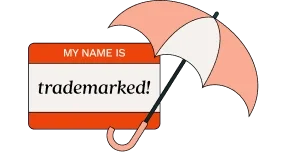A trademark can protect your business name from being used by competitors. To be eligible for trademark protection, your business name must be a name that you use in commerce to distinguish your products or services from the products or services provided by others.

Choosing a name that can be trademarked
You can register a trademark for a business name with the U.S. Patent and Trademark Office (USPTO) if it is sufficiently distinctive and does not create a likelihood of confusion with other trademark registrations or pending registration applications.
Distinctiveness
The USPTO will only register a trademark for a business name that is distinctive: You cannot register a generic name such as “books” or “shirts,” and it is unlikely you could register a descriptive name such as “The Best Cookies.”
The most distinctive business names are “coined,” or made-up, names such as “Kodak” or arbitrary names that use an existing word to identify an unrelated product, such as “Apple” for computers. You can also trademark a suggestive name that implies a product or a product trait without actually describing it, such as “Greyhound” bus.
Descriptive business names are more difficult to trademark. A descriptive name might include a person’s name, such as “Bob Evans” restaurants, or a description of the product or services, such as “Cheesy Pizzas.” To register a trademark for a descriptive name, you will usually have to provide evidence that the name has become so well known that people automatically associate it with your business.
Likelihood of confusion
The USPTO may refuse to register your business name if it finds there is a likelihood of confusion between your name and another registered trademark or pending trademark application. A likelihood of confusion arises if:
- Two trademarks are similar; and
- The trademarks are used in connection with related goods or services. If the goods and services are related, such as two types of apparel, the public might assume that products or services with similar trademarks come from the same source. The USPTO will only allow similar trademarks to be registered if they apply to unrelated goods or services.

Registering your trademark
You can register a federal trademark for your business name by filing an application with the USPTO’s online Trademark Electronic Application Service (TEAS) or through an online trademark service.
- Your trademark application can be refused if there is a likelihood of confusion with an existing or pending trademark registration. To minimize the chance that this will happen, it is wise to conduct a trademark search before you submit your application.
- You can register your business name as a standard character mark, which means you are registering the name itself without any particular design, font, or ornamentation. Your registration will extend to any font, color, or design you may choose for your name. Alternately, you can register a special character mark that depicts your business name in a particular design, color, or font, but your registration will protect only that design.
- You will need to pay a filing fee, depending on the type of registration you want. These fees can change, so check with the USPTO for current fees.
- The registration process will take at least several months.
Looking to register a trademark for your business name? Start with a comprehensive trademark search. If you are ready to continue, LegalZoom can help create and file your trademark application with the USPTO.

